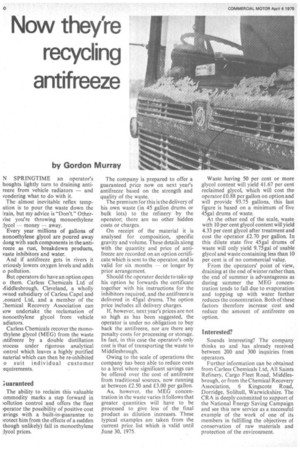Now they're recycling antifreeze
Page 42

If you've noticed an error in this article please click here to report it so we can fix it.
by Gordon Murray
N SPRINGTIME an operator's houghts lightly turn to draining antireeze from vehicle radiators — and vondering what to do with it.
The almost inevitable reflex tempation is to pour the waste down the train, but my advice is "Don't." Othervise you're throwing monoethylene :lycol — money — away.
Every year millions of gallons of nonoethylene glycol are poured away Llong with such components in the antireeze as rust, breakdown products, vaste inhibitors and water.
And if antifreeze gets in rivers it eriously lowers oxygen levels and adds o pollution.
But operators do have an option open o them. Carless Chemicals Ltd of Aiddlesbrough, Cleveland, a wholly pwned subsidiary of Carless Capel and ..eonard Ltd, and a member of the 7.hemical Recovery Association can low undertake the reclamation of nonoethylene glycol from vehicle adiators.
Carless Chemicals recover the monothylene glycol (MEG) from the waste Lntifreeze by a double distillation process under rigorous analytical ontrol which leaves a highly purified naterial which can then be re-inhibited o suit individual customer equirements.
;uaranteed
The ability to reclaim this valuable ommodity marks a step forward in Pollution control and offers the fleet pperator the possibility of positive cost avings with a built-in-guarantee to Protect him from the effects of a sudden though unlikely) fall in monoethylene ;lycol prices. The company is prepared to offer a guaranteed price now on next year's antifreeze based on the strength and quality of the waste. The premium for this is the delivery of his own waste (in 45 gallon drums or bulk lots) to the refinery by the operator; there are no other hidden costs or charges.
On receipt of the material it is analysed for composition, specific gravity and volume. These details along with the quantity and price of antifreeze are recorded on an option certificate which is sent to the operator, and is valid for six months or longer by prior arrangement.
Should the operator decide to take up his option he forwards the certificate together with his instructions for the inhibitors required, and the antifreeze is delivered in 45ga1 drums. The option price includes all delivery charges.
If, however, next year's prices are not so high as has been suggested, the operator is under no obligation to buy back the antifreeze, nor are there any penalty costs for processing or storage. In fact, in this case the operator's only cost is that of transporting the waste to iddlesbrough.
Owing to the scale of operations the company has been able to reduce costs to a level where significant savings can be offered over the cost of antifreeze from traditional sources, now running at between E2.50 and £3.00 per gallon.
As, however, the MEG concentration in the waste varies it follows that greater quantities will have to be processed to give less of the final product as dilution increases. These typical examples are taken from the current price list which is valid until June 30, 1975. Waste having 50 per cent or more glycol content will yield 41.67 per cent reclaimed glycol, which will cost the operator £0.88 per gallon on option and will provide 93.75 gallons, this last figure is based on a minimum of five 45ga1 drums of waste.
At the other end of the scale, waste with 10 per cent glycol content will yield 4.33 per cent glycol after treatment and cost the operator £2.70 per gallon. In this dilute state five 45ga1 drums of waste will only yield 9.75 gal of usable glycol and waste containing less than 10 per cent is of no commercial value.
From the operators' point of view, draining at the end of winter rather than, the end of summer is advantageous as during summer the MEG concentration tends to fall due to evaporation and topping up with water further reduces the concentration. Both of these factors therefore increase cost and reduce the amount of antifreeze on option..
Interested?
Sounds interesting? The company thinks so and has already received between 200 and 300 inquiries from operators.
Further information can be obtained. from Carless Chemicals Ltd, All Saints Refinery, Cargo Fleet Road, Middlesbrough, or from the Chemical Recovery Association, 6 Kingscote Road, Dorriclge, Solihull, Warwickshire. The CR A is deeply committed to support of the National Energy Saving Campaign and see this new service as a successful example of the work of one of its members in fulfilling the objectives of conservation of raw materials and protection of the environment.




































































































